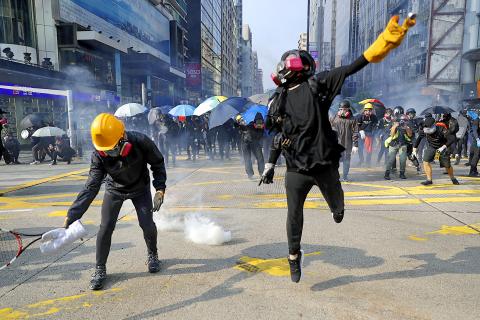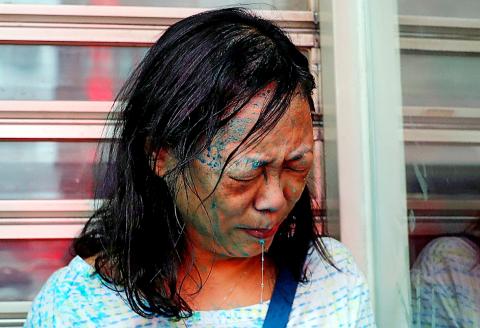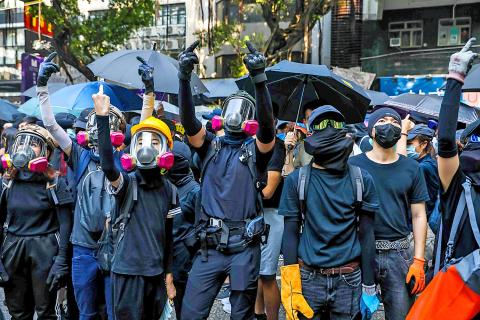Hong Kong protesters yesterday flooded the territory’s streets in defiance of a ban by the authorities on their march, setting up roadblocks and tossing firebombs amid the firing of tear gas by police.
Tens of thousands of people marched down Nathan Road in Tsim Sha Tsui to West Kowloon, despite a police ban on the event because of the potential for violence.
The rally was originally called to protest a government law forbidding the use of masks at demonstrations, and came after Wednesday’s attack on Civil Human Rights Front’s organizer Jimmy Sham (岑子傑).

Photo: AP
Protest leaders carried a black banner at the front of the procession that read, “Five main demands, not one less,” as they pressed their calls for accountability and political rights.
Black-clad and masked protesters barricaded streets at multiple locations in Kowloon, where the territory’s subway operator restricted passenger access.
The protesters tore off stones from the sidewalk and scattered them on the road, commandeered plastic safety barriers and unscrewed metal railings to form makeshift roadblocks.

Photo: Reuters
They sang the protest movement’s anthem and held up placards depicting the Chinese flag as a Nazi swastika.
Police inside the Tsim Sha Tsui police station fired volleys of tear gas and used a loudspeaker to call on protesters in the street below to disperse.
Hardcore black-clad protesters threw firebombs at the station’s iron gate and inside the compound.

Photo AFP
Police also fired tear gas after gasoline bombs were thrown toward one subway station.
A water cannon truck and armored car led a column of dozens of police vans down Nathan Road, stopping frequently to spray liquid tinted blue as they moved to clear the road of protesters and barricades.
Residents jeered at riot police walking alongside the vehicles, cursing them and telling them to leave.
The officers, in turn, told people they were part of an illegal assembly and warned them to leave, and unleashed rounds of tear gas in an attempt to disperse the crowds.
Along the way, protesters trashed outlets of a discount grocery chain because of what they say is its pro-Beijing ownership. They also tried to set fire to ATMs and branches of mainland Chinese banks, setting off sprinklers in at least two.
As night fell, protesters returned to the streets, setting trash on fire in intersections. Police responded with more tear gas.
Matthew Lee, a university student, said he was determined to keep protesting even after more than four months.
“I can see some people want to give up, but I don’t want to do this, because Hong Kong is my home, we want to protect this place, protect Hong Kong,” he said. “You can’t give up, because Hong Kong is your home.”
Many of the protesters wore masks in defiance of a recently introduced ban on face coverings at public gatherings, and volunteers handed more out to the crowd.
Organizers said they wanted to use their right to protest as guaranteed by the territory’s Basic Law, despite the risk of arrest.
“We’re using peaceful, rational, nonviolent ways to voice our demands,” Front convener Figo Chan (陳皓桓) told reporters. “We’re not afraid of being arrested. What I’m most scared of is everyone giving up on our principles.”

CHAOS: Iranians took to the streets playing celebratory music after reports of Khamenei’s death on Saturday, while mourners also gathered in Tehran yesterday Iranian Supreme Leader Ayatollah Ali Khamenei was killed in a major attack on Iran launched by Israel and the US, throwing the future of the Islamic republic into doubt and raising the risk of regional instability. Iranian state television and the state-run IRNA news agency announced the 86-year-old’s death early yesterday. US President Donald Trump said it gave Iranians their “greatest chance” to “take back” their country. The announcements came after a joint US and Israeli aerial bombardment that targeted Iranian military and governmental sites. Trump said the “heavy and pinpoint bombing” would continue through the week or as long

TRUST: The KMT said it respected the US’ timing and considerations, and hoped it would continue to honor its commitments to helping Taiwan bolster its defenses and deterrence US President Donald Trump is delaying a multibillion-dollar arms sale to Taiwan to ensure his visit to Beijing is successful, a New York Times report said. The weapons sales package has stalled in the US Department of State, the report said, citing US officials it did not identify. The White House has told agencies not to push forward ahead of Trump’s meeting with Chinese President Xi Jinping (習近平), it said. The two last month held a phone call to discuss trade and geopolitical flashpoints ahead of the summit. Xi raised the Taiwan issue and urged the US to handle arms sales to

State-run CPC Corp, Taiwan (CPC, 台灣中油) yesterday said that it had confirmed on Saturday night with its liquefied natural gas (LNG) and crude oil suppliers that shipments are proceeding as scheduled and that domestic supplies remain unaffected. The CPC yesterday announced the gasoline and diesel prices will rise by NT$0.2 and NT$0.4 per liter, respectively, starting Monday, citing Middle East tensions and blizzards in the eastern United States. CPC also iterated it has been reducing the proportion of crude oil imports from the Middle East and diversifying its supply sources in the past few years in response to geopolitical risks, expanding

OTHER OPTIONS: Given possible US intervention and Taiwanese counterattacks, China might opt to blockade Taiwan or take its outlying islands instead of an all-out invasion A US think tank has urged Taiwan to adopt a “hellscape” strategy that would flood the Taiwan Strait with drones and other uncrewed systems to deter invasion by China. In its report, Hellscape for Taiwan, published on Thursday, the Center for a New American Security said Taipei’s asymmetric defense approach — often described as a “porcupine strategy” — needs to evolve to keep pace with the growing capabilities of the Chinese People’s Liberation Army. The “hellscape” strategy involves saturating the air and waters around Taiwan with thousands of drones and other platforms capable of striking invading forces from multiple domains at once. Long-range